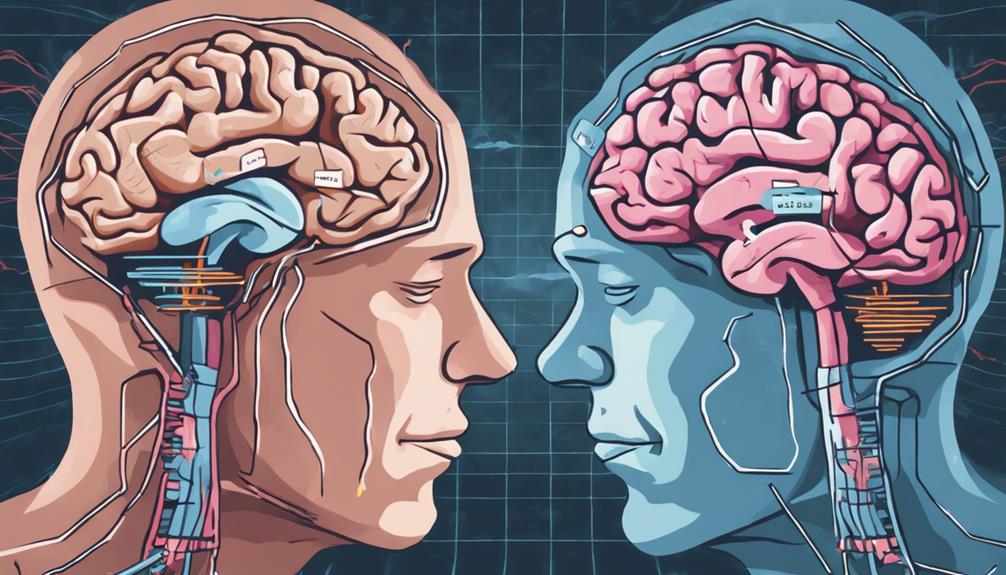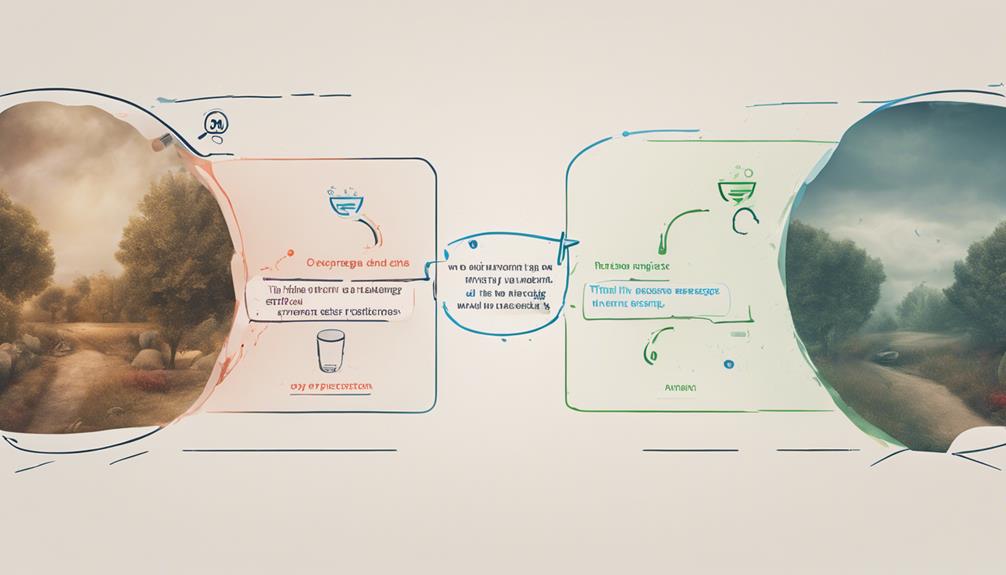Hypnosis is not about mind control but focuses on attention and suggestibility for therapy. It doesn't work instantly; multiple sessions lead to gradual change and long-lasting results. It is an altered state of awareness, not sleep, allowing individuals to remain conscious and in control. Hypnosis is not limited to weak-minded people; it benefits all mental strengths. It respects morals, values, and autonomy, avoiding actions against one's will. It is not mind reading but enhances personal growth and self-improvement. Hypnosis is a natural, evidence-based tool varying in effectiveness among individuals. Understanding these misconceptions unravels the therapeutic potential of hypnosis.
Hypnosis Is Mind Control
Contrary to popular belief, hypnosis is not a form of mind control, but rather a state of focused attention and suggestibility that individuals willingly enter into. Through hypnosis, individuals can engage in mind exploration, gaining deeper insights into their thoughts, emotions, and behaviors.
It is essential to understand that ethical boundaries are crucial in any hypnosis practice, ensuring that the process is conducted with the client's best interests in mind.
Hypnosis offers various therapeutic benefits, such as alleviating stress, anxiety, and phobias, enhancing self-awareness, and promoting personal growth. By tapping into the subconscious mind, individuals can uncover underlying issues and work towards resolving them effectively.
This heightened state of suggestibility allows individuals to reframe negative thought patterns, establish healthier habits, and boost self-confidence.
Hypnosis Works Instantly
Research and clinical experience indicate that hypnosis typically does not produce instant results but often requires multiple sessions to achieve significant therapeutic outcomes. Contrary to the common misconception that hypnosis works instantly, it is a time-consuming process that involves gradual change. Each individual's response to hypnosis is unique, making it a personalized experience that may require patience and consistency.
Hypnosis is not a quick fix but rather a therapeutic tool that can help individuals address a variety of issues, such as anxiety, phobias, and habits. The process of hypnosis involves guiding individuals into a relaxed state where suggestions can be made to the subconscious mind. While some individuals may notice immediate changes after a hypnosis session, long-lasting results typically emerge over time with repeated sessions.
It is important to understand that hypnosis is a collaborative effort between the individual and the therapist, and the effectiveness of hypnosis can vary depending on the person's receptiveness and commitment to the process. Overall, hypnosis is a gradual and transformative journey towards achieving therapeutic goals.
Hypnosis Is Sleep or Unconsciousness
One common misconception about hypnosis is that it involves putting individuals to sleep or rendering them unconscious. However, hypnosis is not a state of sleep or unconsciousness. Instead, it is a focused state of attention and heightened suggestibility.
When a person is hypnotized, they enter a relaxed state that is often compared to deep meditation or intense concentration. This hypnotic state is characterized by heightened focus and concentration, where the individual is more open to suggestions.
Hypnosis does not involve loss of consciousness but rather an altered state of awareness where the individual is fully conscious and in control. It is a relaxation technique that can help individuals access their subconscious mind and explore thoughts, feelings, and memories that may be hidden from their awareness.
In this way, hypnosis is used as a therapeutic tool to address various issues such as phobias, anxiety, and smoking cessation by tapping into the subconscious mind and promoting positive change.
Only Weak-minded People Can Be Hypnotized
There is a common misconception that only individuals who are weak-minded can be hypnotized, but this belief is unfounded and lacks empirical support. In reality, people of varying levels of mental strength can experience hypnosis. Strong-willed individuals are also susceptible to hypnosis, as the process is not about weakness but rather about the ability to focus and be open to suggestions. Personal beliefs can play a role in how effectively someone can be hypnotized, regardless of their perceived mental fortitude.
Hypnosis is a state of focused attention and heightened suggestibility, where the individual is more receptive to the hypnotist's guidance. It is not a reflection of weakness but rather a natural psychological phenomenon that occurs in people across the spectrum of mental strength. In fact, individuals with strong willpower may even benefit from hypnosis by using it as a tool to enhance their focus, relaxation, or achieve personal goals.
Ultimately, the idea that only weak-minded individuals can be hypnotized is a misconception that does not align with the empirical evidence surrounding hypnosis.
Hypnosis Can Make You Do Anything
Contrary to popular belief, hypnosis does not possess the capability to make individuals do anything against their will or moral code. Hypnosis operates within ethical boundaries and does not override personal responsibility. While under hypnosis, individuals are not in a state of unconsciousness or loss of control but rather in a focused state of heightened suggestibility. It is crucial to understand that a person's moral compass and core values remain intact during hypnosis sessions.
Hypnosis cannot force someone to act in ways that are fundamentally against their beliefs or values. The idea that hypnosis can make individuals act against their ethical boundaries is a common misconception. In reality, individuals retain the ability to reject suggestions that go against their moral code. Furthermore, personal responsibility remains a key factor in hypnosis sessions, as individuals are always capable of making their own choices and decisions.
It is essential to recognize that hypnosis is a collaborative process that respects the autonomy and integrity of the individual.
Hypnosis Is Dangerous
Is hypnosis truly a dangerous practice, or are there misconceptions surrounding its safety and efficacy? Safety concerns regarding hypnosis stem from its portrayal in popular media and entertainment, often exaggerating its potential risks. In reality, when conducted by a trained and ethical practitioner, hypnosis is generally considered safe. The practice itself is misunderstood, leading to unwarranted fears of danger.
Research shows that under hypnosis, individuals are not in a state of unconsciousness or mind control. Rather, they are in a heightened state of focus and suggestibility. While rare, some individuals may experience adverse effects such as false memories or heightened emotional responses during hypnosis. However, these occurrences are typically temporary and non-life-threatening.
To ensure safety during hypnosis sessions, it is crucial to work with a qualified professional who follows ethical guidelines and prioritizes the well-being of the individual. By debunking the misconception that hypnosis is inherently dangerous, more people can benefit from this therapeutic practice without unnecessary fear.
You Can Get Stuck in Hypnosis
Misconceptions surrounding hypnosis often include the fear of getting stuck in the hypnotic state, leading to concerns about being unable to return to normal consciousness. However, it is essential to debunk this belief as it is not accurate.
In hypnosis therapy, individuals are in a state of heightened focus and suggestibility, but they are not in a state of unconsciousness or sleep. The hypnotic state is a natural state that people enter and exit regularly throughout the day, similar to daydreaming or getting engrossed in a book.
During a hypnosis session, a trained therapist guides the individual into a state of relaxation and increased receptivity to suggestions that can help address various issues like anxiety, phobias, or smoking cessation. The individual retains full control over their thoughts, actions, and decisions throughout the process.
Once the session is complete, the therapist will bring the individual back to full awareness, allowing them to return to their normal state of consciousness. Therefore, the fear of getting stuck in hypnosis is unfounded, and misconceptions about this aspect of hypnotherapy should be debunked.
Hypnosis Is a Form of Mind Reading
One common misconception about hypnosis is the belief that it involves mind reading. Hypnosis is not a mystical power that allows the hypnotist to read minds; rather, it is a state of focused attention and heightened suggestibility. In a hypnosis session, the individual remains fully conscious and aware of their surroundings. The hypnotist guides the person into a relaxed state where they are more open to suggestions.
Hypnosis is often associated with psychological manipulation in entertainment settings, where performers create illusions of mind control for the audience's amusement. However, in therapeutic contexts, hypnosis is used to help individuals achieve personal growth and self-improvement. It can be a valuable tool for accessing the subconscious mind and facilitating positive changes in behavior, beliefs, and emotions.
It is crucial to understand that hypnosis is not about mind reading but rather about harnessing the power of suggestion to promote relaxation, focus, and personal development.
Hypnosis Is a Mystical Power
A common belief about hypnosis that needs clarification is the misconception that it possesses mystical or supernatural powers. Hypnosis is often misunderstood as a mysterious force that allows the hypnotist to control the mind of the subject. However, scientific evidence suggests otherwise. Hypnosis is a natural state of focused attention and heightened suggestibility, rather than a supernatural ability.
Numerous studies have demonstrated the efficacy of hypnosis in various therapeutic settings. It has been used to help individuals manage pain, reduce anxiety, overcome phobias, and even aid in smoking cessation and weight loss. The therapeutic benefits of hypnosis are well-documented, with research showing positive outcomes for many individuals who have undergone hypnotherapy sessions.
Rather than relying on mystical powers, hypnosis operates on principles of suggestion, relaxation, and focused attention. By debunking the myth of hypnosis as a mystical power and recognizing its evidence-based therapeutic benefits, individuals can better understand and appreciate the practical applications of hypnosis in modern psychology and healthcare.
Hypnosis Doesn't Work for Everyone
Contrary to popular belief, the effectiveness of hypnosis varies among individuals, leading to the understanding that hypnosis doesn't work uniformly for everyone. Individual differences play a significant role in determining the success rates of hypnosis interventions. Factors such as individual suggestibility, willingness to participate, and the specific issue being addressed can influence the effectiveness of hypnosis.
Success rates in hypnosis vary depending on the individual's ability to enter a hypnotic state and respond to suggestions. Some people are naturally more receptive to hypnosis, making it more effective for them compared to others. Research suggests that around 70% of individuals are moderately susceptible to hypnosis, while approximately 10-15% are highly responsive, experiencing profound effects.
To evaluate the effectiveness of hypnosis, it is essential to consider these individual differences and tailor the approach to suit the person's specific needs. By understanding these factors and customizing the hypnosis process, practitioners can improve success rates and enhance the overall efficacy of hypnosis interventions.
Frequently Asked Questions
Can Hypnosis Erase Memories or Make Me Reveal Secrets?
Hypnosis cannot erase memories or guarantee truth serum-like revelations. It does not equate to mind control or force disclosure of confidential information. While it may influence suggestibility, ethical practitioners prioritize client well-being and consent.
Is Hypnosis the Same as Meditation or Relaxation Techniques?
Hypnosis differs from meditation and relaxation techniques in its focus on suggestion and altered states of consciousness. While mindfulness aims for awareness and stress relief techniques target relaxation, hypnosis utilizes suggestion for behavior modification.
Does Hypnosis Involve Controlling Someone Else's Thoughts or Actions?
Hypnosis does not involve controlling someone else's thoughts or actions. It is a state of heightened focus and suggestibility where individuals willingly follow suggestions. It does not equate to mind control or manipulation.
Can Hypnosis Cure Physical Ailments or Chronic Illnesses?
Hypnosis is a complementary therapy that may assist with managing symptoms of physical ailments and chronic conditions. While it can promote relaxation and potentially improve well-being, it is not a standalone cure for chronic illnesses.
Is Hypnosis a Substitute for Therapy or Medical Treatment?
Hypnosis can be used as a therapy alternative for certain conditions, providing a complementary approach to traditional treatments. However, it is not a substitute for medical treatment, as it should be integrated into a comprehensive care plan.
Conclusion
In conclusion, the misconceptions surrounding hypnosis are rooted in misinformation and misunderstanding. Through empirical research and evidence-based practice, it is clear that hypnosis is not mind control, does not work instantly, and is not a form of mind reading.
It is a therapeutic technique that can be effective for some individuals, but it is not a mystical power and does not work for everyone. It is important to address these misconceptions in order to promote a better understanding of hypnosis.











































